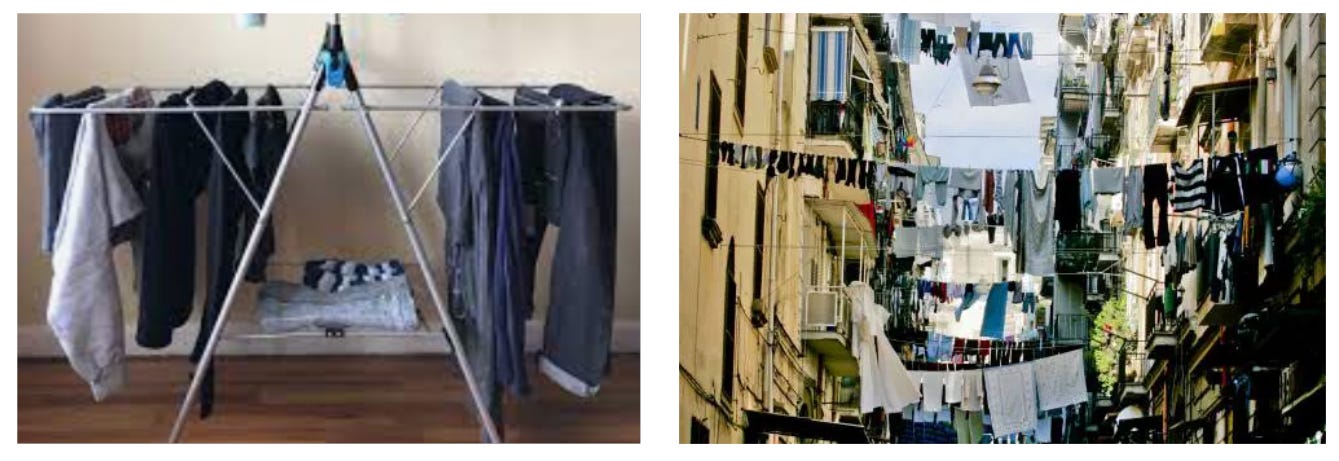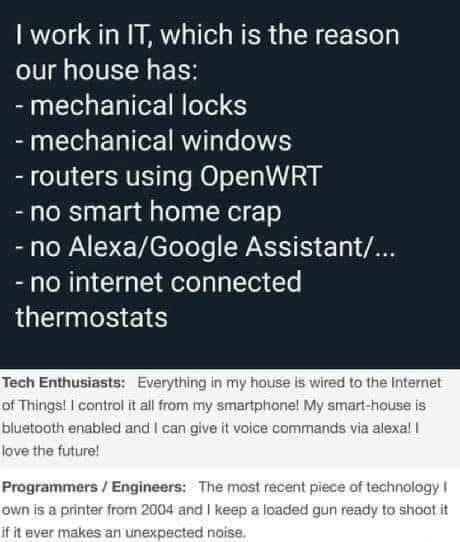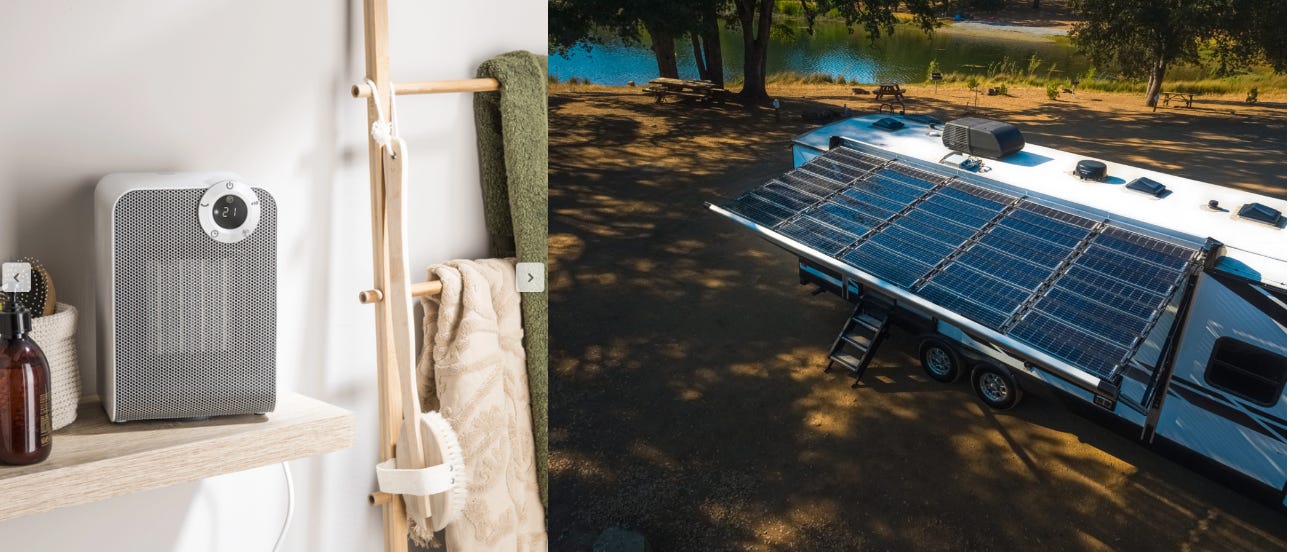The REAL "smart grid" should be INSIDE your home. And every other home
or, why your next phone chargers and home appliances may have BIG, POLITICAL impacts
(with my apologies for skipping a couple of weeks, but until this newsletter really takes off, I must sometimes put it behind paid work...)
Even certain problems didn't exist, we must reduce energy consumption to rescue our own mental health (for details, see "FIRST way to make ANY power cheaper" here.)
Here, I outline some strategies to save electricity at home that aren't known as much as they should, may help young couples looking to buy or rent their first or second place, and may also have some very interesting political consequences. Let's look at them, in three parts.
Part 1: What you may know, but it's useful to recap
There are LOTS of things in stores, if not already in your home, that, ten or more years from now, you will quite likely regret you bought. As far as we are concerned here, the things to avoid in a really smart home include, with obvious exceptions for people with disabilities, reduced mobility or other impairments:
First, almost everything that is "Home Automation", or "Smart Home", or "AI powered" or otherwise "online".
Technologies like those can and should do a lot of good for society, when applied to agricultural, industrial or business processes .
When rammed inside home or consumer products, instead, the same technologies mostly yield overpriced gadgets deliberately designed to hate each other, hate you, spit on your privacy, endanger your data and be turned into e-waste WITHOUT your consent, while locking you into costly, proprietary upgrades, but for much less time than you would need.
All that, and for what? In the great majority of cases, there is NO sensible adult need for stuff like fridges or washers to be online, or even to be remotely controlled. If you really need, on a regular basis, to remotely start or check your dishwasher, door, lights etc, or ask your fridge which groceries you should buy... you need a smarter, healthier, better life, not un-smart appliances.
Second, wireless charging. Real innovation, like e.g. technology that charges small devices with dim, ambient indoor light , possibly without any battery (also here), could be actual progress. But "wireless" charging just replaces the charging cable you already had with another one, attached to one more piece of soon-to-be-e-waste, that cannot be more efficient than a plain cable. There's no reason on Earth to be ashamed of USB-C cables.
Third, uselessly BIG stuff, from fridges that were already too big ten years ago to TV screens that are often just TOO big to make sense in YOUR ACTUAL ROOM.
Fourth, anything that may harm you, by not working in the worst possible moments, because it was electrified or connected just to grab more of your money. Examples: terribly stupid "smart" locks, electric can openers useless in storms, and electric-only roll-up shutters that may trap you inside during blackouts, fires or loss of internet connection.
Just avoid all that stuff, without giving up modern tech that does make sense. Even if it did really look like "going back to the 1960s", so what? Are you really, really sure it would be a step back?
Part 2: What you probably don't know or had not thought about yet
Heating, cooling and BIG appliances
Since online advice on how to save on home heating or cooling abound, I will add here only two small examples that are directly related to the bigger point I'm going to make. In many places, a "desktop heater" as in the collage below (200 grams, 16x25x15 cm, 40 EUR or less), turned on only during showers in the two or three coldest months of the year, could be all the heating a "First World", actually smart bathroom really needs. Similarly, since air conditioners should run at minimum power to avoid getting sick, worldwide their users could combine them with awnings, that also reduce indoor temperature by design... "stolen" from recreational vehicles:
Speaking of big appliances... Fridges, washers and dishwasher are necessary, and how to pick the right ones is easy to explain, if not to do, because we are surely doing home appliances wrong. Next week, as it already happened and will happen again to million others before we restore sanity, I will probably be forced to buy a new fridge.
Why? Of course, because repairing or replacing the tiny but proprietary control board of my out of production model that would otherwise work perfectly would cost half a new fridge.
Energy efficiency is mandatory. But always, always, always get the smallest and simplest appliances you can afford to live with. Be proud of it, and learn all the possible tricks that may help you to do so. For example, did you know that butter would be just as happy, if not happier, at room temperature, instead of inside a fridge? (add your tricks in the comments, please)
Concretely, do as much as you can to have fridges, washers and dishwashers that are harder to break, and easier to repair by independent technicians, because they come with as little displays, electronics and software inside as possible. It is still possible, for example, to buy fridges with only one thermostat to set and many less moving parts that may break. Also, demand more Right to Repair laws, now!
If you are wondering why I didn't mention dryers, just accept that "simplicity is the ultimate sophistication". Clotheslines are not usable everywhere, of course, but I will never understand the waste of electricity that so many Americans tolerate, or impose on themselves, just to avoid being shocked by reminders that they and their neighbors use knickers.

Cooking, and how to reinvent it
Relax! When I say cooking, I mean real cooking of real food, not the "microwaving TV meals to eat alone on the couch" thing.
My mother was a serious Italian Housewife, who couldn't conceive of not cooking three-course meals, 7 days a week for all of us, with as many raw, fresh ingredients as possible, constantly reinventing traditional recipes. About 15 years ago, she realized that she could continue to do so in spite of her aging arms with this:

and she liked it so much that, in order to make me buy one, she pretty much forced me to attend an official demonstration. So, one day, a very professional saleswoman came to show me what a time-saving, upper-class, really healthy bourgeois I would become by cooking with a Bimby.
Me, I had a completely different epiphany: looking at that lady cooking an actually decent quantity of pasta and a real, palatable fresh tomato sauce for it at the same time I thought:
"Hey, if they plugged that thing into some photovoltaic panels, even villagers living off-grid could in a very small hut could cook without getting sick from smoke!"
My second thought was: why should this kind of progress limited to developing countries? That is, why bear all the costs of a big kitchen, when up to three people could cook real meals with something that takes only 30x30cm of counter space?
If one Bimby weren't enough for your family, you could imitate the guys "filling most of their cooking needs" in Vermont with just "a couple of $50-$100 induction hot-plates placed over the [old] stove", or the other guy who electrified his cooking in Rome with a 125 dollars hack.
Another really promising strategy is... "extending" rice cookers. Even if you aren't into rice, there is a very good reason why rice cookers made Toshiba mountains of money. It's the fact that, as explained in detail in this (italian) post rice cookers may cook rice, pasta and more, much more efficiently than any pot over any stove, for one simple reason: the fact that their heat comes not from the outside, but from the inside of the pot, and cannot escape it, because the pot is thermally insulated:
Part 3: Where all this leads, and its REALLY intriguing IMPLICATIONS
Following all the tips you just read saves money without any real damage to real quality of life. Quoting again, "what's wrong with reducing energy consumption by 40 per cent and going back to living standards of the 1960s?" I mean, is it really worth getting in debt, for not so much more? Is there anything to be ashamed of in refusing to keep up with the Joneses on this? Why should you feel embarrassed to spend your money in other, more sensible and actually useful ways?
Besides, it doesn't end here. With any luck, the tips outlined here may lead many people to even bigger savings, and eventually to the "political consequences" I hinted about.
I have seen estimates that, within the next 20 years, as much as 50% of the total loads in households could become consumption of Direct (DC), instead of alternating current (AC), and there are already DC-powered fridges and similar big appliances that may make that percentage even higher.
"Disrupting" your electricity consumption in (at least) all the ways outlined here may make it much easier for you and everybody else to live, possibly much, much earlier than 2044, in a home powered, at least in part, with direct current (DC) instead of alternating current (AC).
Being "equipped" to live in a place with 12 Volt DC wall plugs, instead of the 125 or 220 Volt AC ones ubiquitous today could be a really big deal for one, hopefully two reasons. The first is even bigger money savings, because:
it does indeed make very little sense to "waste so much money pumping AC through our walls just to convert it at nearly EVERY plug!" BUT...
If they could rely on 12V DC wall plugs, all your devices that already use DC current internally could get rid of adapters, transformers and other internal components, that is become "simpler, cheaper, more reliable"
The other major advantage, albeit accessible to many less people at least in the short term, is that DC wall plugs could be wired directly to solar panels, thus making their adoption "significantly cheaper and more sustainable".

What I'm saying here is that we are finally getting closer to something I first envisioned some ten years ago: the moment when, combining sensible product choices and adoption of domestic DC power distribution, much if not all the amount of electricity you'd need to live comfortably in a condo apartment is small enough that a few solar panels hanging from its WINDOWS, plus a small volume of batteries, could provide it.
That is, we are approaching the moment where even many residents of apartment buildings can be energetically self sufficient.
This is important because, besides saving a lot of money, it would be a political revolution.
Imagine apartments where, even if solar panels could not power ALL your appliances, you could still cook, communicate and be informed during emergencies, or in periods when you couldn't afford a full, old-fashioned AC electricity bill.
Imagine a world where even every DIYSWoP (Dual Income, Yet Still Working Poor) family has at least the peace of mind of knowing that no utility company could grab from their bank account the money that must go for groceries first. Or that cooking is possible even when they only have money for their work commute.
That is, imagine a world where a lot of those 70% of all humans lives in urban buildings... but without any possibility for any "authority" above to cut off their energy (and therefore communicate) if they don't behave.
That would be an interesting world, wouldn't it?
So the question becomes: which builders, and regulators will have the guts to promote and build affordable apartment buildings like these? For cities like these, maybe?
Please do share your tips and stories for comfortable, but LOW energy apartment living, and don't forget that, besides subscriptions, you may also support my work with one-time contributions as explained here. Thanks!








